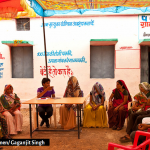Capacity Building: Training or Organisational Development in Panchayats?
6 April 2022
A dawning realisation from my recent and continuing engagement with the recasting of the National Capability Building Framework of the Government of India is that different people look at the idea of capability development differently.
If you are from a State Institute of Rural Development, the chances are likely that you think that training of elected members and officials of local governments constitutes capability building. An IT consultant tends to say that software suites and process reforms will remarkably increase capability to perform. An HR consultant says that organisational development; designing of chains of command, instruction pathways and properly assigning functional responsibilities, is the key to better local government functioning.
The truth is that all of them are right, but none of them are exclusively right.
Yet, the conundrum for the designers of a government policy on capability development, is where to put one’s effort and funding. And here, one can get bogged down. One might invest heavily in one effort without paying attention to the others, or run aground in the process of choosing the right supplier of services, or make mistakes in the choice of an organisational design.
Having been involved in some of these exclusive efforts in training, in software development and IT enabling, and in HR focused organisational development, I have seen pitfalls in all three approaches.
The danger of focussing exclusively on training are three. First, designing and rolling out training for large numbers of elected representatives is complex and needs high effort, without any guarantee of success. Quality is paramount; yet there is the strong temptation to cut corners to achieve numerical targets. The plan may call for just 20 individuals in each classroom helped by three resource persons, but who looks at the quality anyway? The temptation is to crowd 60 people into a room for a boring lecture; the numbers look so much more impressive in reports and that enables more money to be drawn for more meaningless training sessions.
Second, even well designed and delivered training can be useless if the reality of the political or administrative situation is that the trained individual cannot use the new skills learnt to achieve anything. If a trained and inspired elected representative is thwarted by an indifferent official or is frustrated by a weak system from getting anything done, training can be counterproductive, as it can make her cynical.
Third, training creates a vested interest amongst trainers, a powerful lobby that finds comfort in more training. It creates assured jobs for trainers, with no real results forthcoming.
It is easy to believe that technology and software can transform local governance. This impression is reinforced by some widespread successes, such as the implementation of the NREGA software suites, which not only gives information about NREGA works but also ensures the online payment of wages. However, the fact remains that in spite of computerisation of Panchayats, the quality of governance has not improved dramatically.
Some certificates are available and some beneficiary lists are prepared online, but in terms of interface with citizens, or with respect to transparency of the processes within a Panchayat, matters have not improved. One of the main failings of putting one’s faith entirely in software and attendant process reforms is that it empowers those who acquire these skills. Thus, data entry operators gain more power than a Panchayat President.
Second, while some processes do get streamlined through software, others are surprisingly obstinate to process change. For example, softwares that can intelligently translate Grama Sabha decisions into Panchayat budgets, while available, are not used. Accounting software is a mirage. While they function brilliantly in demonstrations, in actual use, it is as difficult today to obtain real-time data on Panchayat expenses as it was a decade back. I should know; as a consultant to the 15th Finance Commission, we found it impossible to obtain real-time data on Panchayat expenditure from most states.
Last but not the least, is the problem of identifying appropriate software and deciding which is the best for the Panchayats. While the government software providers are suspicious of external vendors and claim that they are mostly fly-by-night operators who are unable to maintain software in hundreds of dispersed offices, the latter claim that government software is user unfriendly, full of bugs and inflexible.
Different people look at the idea of capability development differently.
Organisational fixes hold out great hope.
Most Panchayats are organisational nightmares. They have scanty secretarial support; in many states, the staffing position is abysmal. Furthermore, even in relatively well-performing states, we seem to be labouring under the delusion that a Panchayat can function with a single Secretary and a smattering of clerks for support. There is no provision of a full-time engineer and a social support individual, which is surprising considering the range of decentralised infrastructure a Panchayat is supposed to create and the number of social sector programmes they are expected to implement or supervise.
Though legal provisions mandate that Panchayats need to undertake regular and meaningful consultations with citizens, the process takes effort, for which the Panchayat has nobody to utilise.
Thus, cutting across most states, Panchayat-elected representatives are scrambling to perform in addition to their political activities, quasi-executive functions on behalf of their panchayats. They not only work with the people but are following up papers, getting bills cleared, signing cheques (where permitted) and doing a host of other things that a well-organised office should do on their behalf.
Can training, software deployment and organisational development go together? By all accounts, they must. However, will compartmentalised funding approaches for each of these, which have been the norm so far be changed to provide support for all three to proceed in a coordinated fashion? That remains to be seen.
T.R. Raghunandan is an Advisor at Accountability Initiative.
Also read: India’s Capability Building Framework and the Reshaping of Panchayat-level Training




